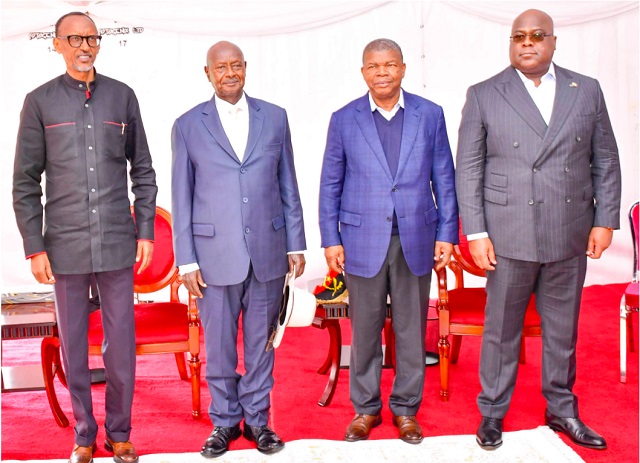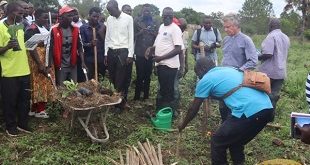
Inside the complicated relationship between Uganda, Rwanda and the Congo
THE LAST WORD | Andrew M. Mwenda | The economist, Prof. Paul Collier, calculated that, holding other factors constant, economic growth in a neighbouring country can add up to 2% on the economic growth of your country. Therefore, a country having neighbours that are prospering economically gets coincidental additional growth even when doing very little. Economists call this “positive spillovers” or “positive externalities” – the coincidental (or accidental) benefits that accrue to someone because of proximity to good fortune. And if you have good public policies, and the institutional capacity to implement them, but you leave in a bad neighbourhood, your economic growth will be constrained.
This is the dilemma that countries like Uganda, and especially Rwanda, face. Rwanda has good economic policies and excellent institutional capabilities to implement them. But it neighbours Congo to the west and Burundi to the south are failed states with stagnating economies. Uganda borders Congo to the West and South Sudan to the north, another failed state with a retrogressing economy and civil war. And beyond, in the neighbourhood, are other failed states with declining economies such as Somalia, Central Africa Republic, Chad and north Sudan.
Countries can choose their friends but not their neighbours. If you are, like Uganda and Rwanda, located in a bad neighbourhood, you pay a high price for actions beyond your control. Efforts by Rwanda to build a consolidated state with a prosperous economy get thwarted by chaos and insecurity emanating from decisions by the leaders of Congo and Burundi. Uganda suffers similarly. So, the two countries are permanently involved in fire brigade exercises trying to put down fires in Congo and South Sudan.
This problem is compounded by decisions on what to do getting heavily and unduly influenced by international actors, especially the great powers of the world in Western Europe and the USA. They meddle in regional affairs, all too often, with hideous aims and wrong assumptions. And they have a lot of influence because they control a significant share of the global economy. So, they can bully and blackmail our poor countries with economic and political sanctions adding insult to injury. Chaos in Congo, already making our economies fragile, is compounded with economic sanctions when our states take decisions to cushion themselves against the costs and consequences of Congolese mismanagement.
Rwanda has two main interests in Congo. First is the FDLR rebel group – remnants of the people who committed a genocide in that country in 1994. This rebel group is now an integral part of the Congolese army. They may be militarily weak. But they carry with them a highly toxic ideology of Hutu power. This ideology cannot, and should not, be given a chance to proliferate. The second is the refusal of the state in Congo to recognise the citizenship rights of indigenous Congolese Tutsis. Unless these two issues are addressed comprehensively, Rwanda will not rest. And this cannot be done without the active participation of Rwanda and regional powers. The Congolese state is too weak to solve these problems.
Uganda’s position is not as bad as that of Rwanda but bears similarities. Our country’s troops were deployed in Congo to fight the ADF rebels. Uganda cannot legally have its troops in Congo without the permission, cooperation, coordination and friendship of Kinshasa. Yet for us to be successful in our operations against the ADF, we need the support, cooperation and friendship of the local communities in the areas we have deployed. Without their active support and cooperation, our efforts would be doomed. If Ugandans fail to win their support, the local communities will hide the rebels in their homes, feed them from their farms and provide them critical intelligence about the movements of our troops.
The problem is that local communities in Ituri province don’t like the government in Kinshasa and its army. Whenever the government shows up, it is to collect taxes. And they do this with unmatched brutality. When the Congolese army comes, it is to loot, rape and pillage. The people in these areas see their government and army as enemies. But they see UPDF as the protector of their interests and desire its presence because it treats them with courtesy. However, UPDF works closely and jointly with the Congolese army to fight ADF. To the local community, UPDF is in alliance with the enemy. The challenge for Uganda is how to reconcile these conflicting interests.
Two months ago, leaders of 21 ethnic groups in Ituri province came together and formed a political organisation to represent the interests of their people. They elected Thomas Lubanga as their leader. Lubanga was arrested in 2006 under a warrant issued by the ICC. He was taken to The Hague, tried and convicted of using child soldiers and sentenced to 14 years in jail. He served his sentence and was released in 2020. That the local community in Ituru still see him as a legitimate leader shows how this international tribunal is disarticulated from the realities of Congo. It also shows that these international institutions seek to impose a version of justice on a community against its will. Otherwise, how come the alleged victims of Lubanga’s atrocities still embrace him?
Anyhow, seven fully armed militias in Ituri have formed a joint high command under the leadership of this political umbrella led by Lubanga. They accuse the Congolese army and its allied militias of committing atrocities against their people – mass murder, pillage and rape. They want to launch a war against Kinshasa but are concerned about the attitude of Uganda. They see UPDF as an ally that protects their families and property against marauding militias from other ethnic groups and the Congolese army. But they also see UPDF is allied to the same Congolese army, working with it in operations against ADF. So, if they attack the Congolese army, will UPDF intervene? On whose side?
UPDF’s mission in Congo is clear: to fight ADF. Uganda would not like to get entangled in domestic Congolese conflicts. Yet Kinshasa has been trying to get Uganda to do exactly that – like asking Kampala to attack M23. The relationship between Kampala and Kinshasa gets complicated every day by these issues. For instance, if the Congolese army and its allied militias massacre people in reas of our operations, the very people whose support and collaboration Uganda needs to fight ADF, what should be the attitude of UPDF? Kinshasa wants UPDF to be on its side. The local community want UPDF to on their side. What should Kampala do?
****

amwenda@ugindependent.co.ug
 The Independent Uganda: You get the Truth we Pay the Price
The Independent Uganda: You get the Truth we Pay the Price




Okay i think that as jounalists having too much accessing and annalize any reason occurs on front desk, today as general jounalist having one problem about politics they undersand inside behind coverd but they didnt to addressing the public to know about the main issue, you and others they knows facts is the british are bosses here uganda and africa and control and all orders and the heart of politics roots started in europe usa uk then spreading africa. What i mean africa not independent to any reason because today and ago where we getting money to organize the elections? Who under the control and decision to any issue here, good enough as you mwenda were flight to america to study but or was left with empty head with no learning any package to politics and leadership and powers those are different to know but find me to tell you agenda and mission but i see the fake topics published and i getting sadnely obout honors, since 1966 old people not learned but till today walking in lies and to called clever
I read Mwenda claim, “If you have good public policies and the institutional capacity to implement them, but you leave in a bad neighbourhood, your economic growth will be constrained.This is the dilemma that countries like Uganda, and especially Rwanda, face”. Certainly this cannot apply to Uganda situation in the last fifteen years , whose institution and focus is on serving the Museveni family and their personal interests. Kenya has had bad neighbours—Uganda, Somalia, and South Sudan—for a long time. This has not stopped her from making some good progress towards prosperity. The same applies to Ethiopia. In Uganda, you don’t even need Europe to access and control her economy, but President Museveni who has sold all that Uganda has to foreigners and concentrates on the economic interests of foreign companies at the expense of local ones. In fact, he kills local companies to prosper the foreign ones. The only time he goes against a foreign company is when he wants his family to control that resource; we have many examples, such as umbrella or disguised/real ownership of companies that print national passports and IDs, as well as driving licenses. Give UMEME time, and you will see in whose hands it will end after so-called nationalization. He has controlled and suffocated prices of coffee, cotton, tea, and forestry and left dairy farming to prosper the interests of his tribe mates who are so much involved in dairy farming. With regards to Congo, the bad neighbours are Uganda and Kenya. Tanzania has been stable and has not invaded Congo, despite sharing borders with Burundi and Congo. Museveni and Kagame will not rest until they capture or divide Congo and expand their influence and power, thus establishing the Hima-Tutsi empire. As for those attacking local communities in Congo, UPDF has a tendency to dress like a national army, e.g., like the Congolese army, and cause many atrocities so that the locals hate their own army. Afterwards, the same UPDF will return to those areas, posing as peacemakers and mediators. This was a trick that Museveni used during the bus war 1981-1986. He also employed this tactic extensively in Northern Uganda against the Lord’s Resistance Army. Congo needs to watch out.
Some elements within the UPDF and other well heeled purveyors will privately but vigorously oppose your submission
Very well: Congo accepted the FDRL, “and are now an integral part of the Congolese army”. Let Rwanda take the Tutsis and make them an integral part of the Rwandan population. Why would it be Congo to accommodate two groups of Rwandese, good or bad?